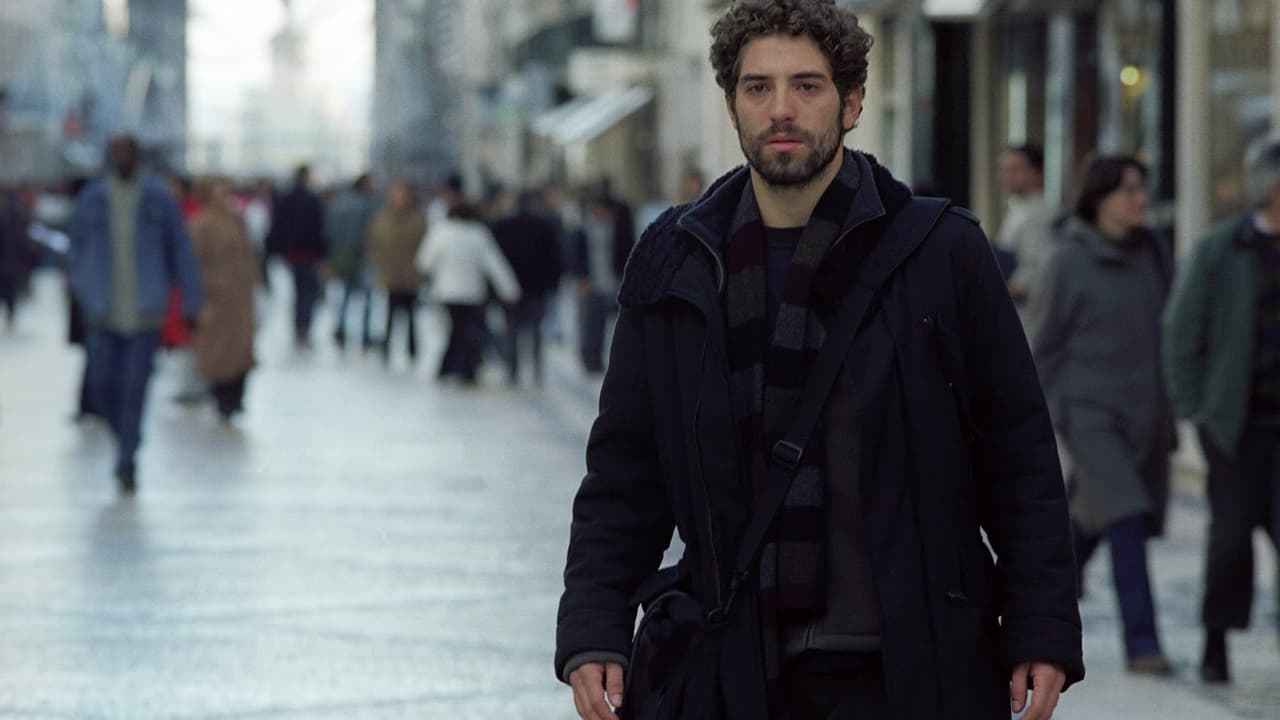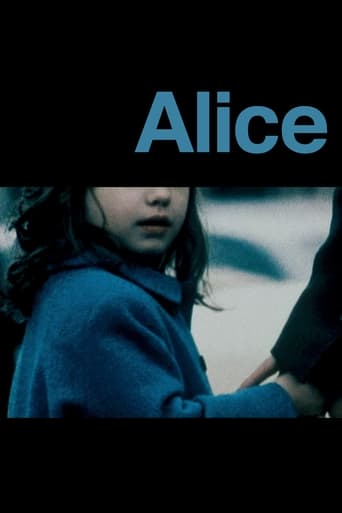

There is much to be said about this one. It's fantastic to be able to appreciate such a picture, to live the moment where this finally happened. I don't know much about M.Martins, i hadn't heard of him before this one (and practically no one had). i also don't know what he'll do next. But i put this one along with a very few number of "difficult to get better" first tries by any director (a list with titles such as "a bout de soufflé" or "citizen kane").The city is the theme. Forget the story. It is there. Period. It serves the purpose of grasping a city hardly seen on screen before this. Period. that's all there is to say.So this succeeds where "Ossos" and "O fantasma" had failed completely; in showing Lisbon out of clichés, of preconceived warmed up imagery's. Time goes on, cinema has to catch it. This is catching up with time.This brings the city to zero ground. The screens (how many do we see during the film?) that belong to Lopes's character are the white canvas where actions draw themselves, in blue. The camera (an experimenting young director, says me) tries to fetch them, tries to make them eternal, all the scenes, everywhere. Lopes (the actor, real life and in this film) tries to get to them, he participates, he can even show up in front of a camera, but he can never control it. So, the actor as a pawn, constantly exposed, never in control. This is cinema, and Mário (Lopes) understands it the moment he sees 10 times his face on the screens of a store. He also performs a play, a comedy, inside the play which is the film. Double manipulation. Great material! He is an actor, manipulated to appear the way this visionary director wants, and he plays an actor, who is forced to perform something he is not the least interested in, to be able to proceed with his other function, which he thinks he controls, but he doesn't.The camera can be "god", a character, or it can grab a character and follow it. The camera can be the spectator, our curiosity moving around. Here, the camera is a mood, a spiritual landscape, such as the music. It's a dot placed on the infinite. So it doesn't matter if it focuses or unfocuses, or what it focuses, first or second plan, cars pass in front, also people strange to the scenes (every people are strange here). "Freewill" framing, apparent chaos, apparent "no man" camera. This is the true quality of Alice. All so contemporary, all so apparently chaotic, still, everything controlled we don't know how, nor by whom. This is Lisbon.Still, i don't hold the optimism (nor the skepticism) of the common Portuguese cinema buff. I don't watch this one as "the new path that will improve Portuguese cinema for good". One film, especially on this author basis, doesn't change a hole (inexistent) cinema industry. But i do think that, from a cinematic point of view; this is worthwhile, and has a place on the top of my shelve.Dialogs subtle, right, rigorous. Music may be the only apparition of the missing Alice. Photos, flyers and even Alice herself don't count. This is one of the best minimalist soundtracks ever. Glass would make Koyaanisqatsi differently if he could have seen this first. But than again, this is so much better than Reggio's living-death tail of industrialization.The city is blue, so is Alice's coat, he's always seeking blue... and failing to find it. Think about. You should watch this along with "Lisboetas". This one first.My evaluation: 5/5 fantastic cinematic essay.P.S. - I just feel pity that watching the making of and the extras makes me feel that this was all luck, and no one involved gave a single thought to what i just said. I wish the extra material could be more useful than just curious (it could be both).http://www.7olhares.wordpress.com
... View MoreFollowing the comments that have been posted up until now I also think this movie could be a little bit shorter or faster paced. Besides that... Everything suits and fits the style that was intended. I'm not familiarized with the work of Manoel de Oliveira but I sure loved the consistency and emotional tension delivered by this fair example of good Portuguese movie production. Loved the cinematography and casting as well as the soundtrack which is nothing less than minimalist and straight to the point.A sad story told in a "sad" way. The absence of dialog in some scenes is almost scary due to the tension involved around the baseline of the plot. The two main actors are capable of making us believe they are truly feeling broken inside, lost in their own senses, confused by an harsh reality, truly great work by everyone involved.I'm not gonna write about the plot itself because if you're reading this you probably are already familiarized with it but I can say I was very depressed at the end and that's good in a drama.By the end credits you feel ready to cry under your sheets. What you've just watched and felt is too catastrophic and heartbreaking to belong to reality and the scary thing is that you realized exactly that. There's little fiction about the whole thing...7/10
... View More"..A father searching for his missing daughter.." That is as much as you should know beforehand; a large part of the film's genius is in its pacing. Without narration, without explanation, the camera gives us a steady succession of images to puzzle over that slowly, with sparse dialog, start piecing together. A simple story that tells itself slowly and broodingly, its bleakness and despair underscored with grim lighting and tight, restrained acting.*** possible spoilers *** As the camera first follows Mario wandering between cars on the highway it shows very little of what's going on. Mario's worn, expressionless face and his lurching progress through the traffic hint at some interaction with the drivers but one is left to wonder if he's there to clean windshields, to sell Kleenex... Eventually, in a parking lot, we see that he's distributing flyers but again the camera withholds the detail and one is left to suppose that it's propaganda that he's slipping under windshield wipers. Finally, as he distributes them to indifferent pedestrians, the camera shows us a flyer with its foto of the missing Alice.¡¡I applaud this pacing!! The same pacing continues with Mario's checking of the first camera. One is left to wonder, to search for the logic of events. We still don't know who Mario is: we saw him leave a woman's bed in a cramped apartment in the early morning, we saw his mute progress through the streets with the flyers, now he's let himself into this well appointed loft or office and gone about his routine of changing the video cassette... Who is Mario? Why does he leave with so many keys? He doesn't distribute propaganda for a living, does he house-sit? Everything comes clear, at its own speed. The flashback in the middle, presented as it is without demarcation, is disorienting at first but also becomes clear.The acting is flawless and without artifice. One isn't given enough distance to admire the acting, as one is too involved with the characters and their inner workings. Mario (Nuno Lopes), with whom we begin to sympathize as we realize the method to his madness, has a clarity of purpose that holds him together and keeps him going. The collusion of those who assist him in his search also serve as moral support; when his logic is questioned, or when a supporter fails him, he is threatened. Luisa (Beatriz Batarda) is shattered and unable to heal precisely because of Mario's unwavering purpose. Although she was the outwardly distraught of the two when Alice first disappeared, one has the sense that she could put it behind her and start again, if only Mario would return to her. She can't fathom the french-fry uniformity that Mario has made of their days.*** definite spoilers *** My only grievance with this film is the predictability of Mario's breakdown in the moment where he renounces his search. Perhaps, rather, it is inevitability. It rings true, but one sees it coming well in advance. Mario's tortured thrashings in his studio as he scatters photographs is the one sequence that borders the artificial, smacking more of contemporary dance than of spontaneity.The conclusion of the film was, for me, pure genius. I found it impossible, given the tenor of the film, that Mario would eventually find Alice. What I never even considered was that he would miss her. It made me wonder how many other times he might have passed her in the crowd, moments outside of the narrative of the camera.I missed the quote from Alice in Wonderland at the end of the credits; ¿can anyone enlighten me? *** end spoilers *** In conclusion, I recommend Alice to any and all who have the patience to let the film unfold. Myself, I'll be looking out for other work by Marco Martins, Nuno Lopes and Beatriz Batarda! Two thumbs up.
... View MoreOne of the best Portuguese movies ever produced. A simple, straight story about Mario, a father searching for his missing daughter - Alice. Shooted in a dark, depressing way with strong and moving roles. Mario creates an illegal video surveillance network all over Lisbon, watching hours and hours of DV tapes every day in high speed, expecting to see some clue about Alice. One day the search seems to be over. If you like to watch different cinema with alternative views and ideas you can't loose this one! Won a prize at 2005 Cannes Festival. The music by Sasseti is also intense, somehow like some tunes by Tiersen in "Lenin" or "Amelie".
... View More